

I really don't get the hype.
... View MoreFun premise, good actors, bad writing. This film seemed to have potential at the beginning but it quickly devolves into a trite action film. Ultimately it's very boring.
... View MoreAs somebody who had not heard any of this before, it became a curious phenomenon to sit and watch a film and slowly have the realities begin to click into place.
... View MoreThe film may be flawed, but its message is not.
... View MoreI felt much the same way about this one as I felt about the previous, more famous Yoshida film I watched last week, Eros + Massacre: it's gorgeous but maddeningly esoteric. As a result of its difficulty, I found the film fairly boring. This one is perhaps even more difficult than Eros + Massacre, but it's also 90 minutes shorter, so I'd rate them pretty much even. The film involves Communist revolutionaries in Japan, who were more or less outlawed in the country by the U.S. The film spans several time periods, including the distant future of 1980 (you can tell it's the future because of the theremin music). The main action begins in 1952, which was a turbulent year for student protests. One might just watch it for the visuals - what Yoshida does with space is absolutely astounding at times. The filmmaking often brings to mind Antononi and Resnais. But it's hard to watch it just for the visuals when you know Yoshida is trying to get at something and is so deadly serious about it.
... View MoreThis movie is truly something special. Actually, it's so special that I don't know what to write about. So much is discussed in this film and equally as much is there worth discussing about it, yet there's nothing I can say or write that will adequately describe this movie. No, you simply have to experience it.Rengoku eroica, that is, Heroic Purgatory, is the second film in Yoshishige Yoshida's Trilogy of Radicalism, preceded by Eros + Massacre (1969) and followed by Coup d'etat (1973). Yoshida's work has always been on the avant-garde, artsy side, but Heroic Purgatory is so fantastically bizarre and unconventional that the rest of his opus seems perfectly normal in comparison.Eros + Massacre was Yoshida's magnum opus, pretty much, the film that marked his career. After such a film, directors usually have three options as to what to do next; they either make something even more stylish and unchained, or they quit making movies overall, or they start making more normal films. Yoshida did all three; first he made Heroic Purgatory (a heapton crazier and more puzzling than Eros) and Coup d'etat (which explored Japanese politics more in-depth than Eros did), then he didn't make a movie for 13 years, then he returned with more level-headed pictures.So what is this movie about? Good question. What I got out of it is that it's about an atomic engineer Rikiya Shoda and his wife Nanako (played by Yoshida's wife Mariko Okada). While Rikiya is doing some important laser business, his wife returns home with a lost teenager called Ayu. Then, out of the blue, some guy enters their household and calls himself Ayu's father, but Ayu claims that Rikiya and Nanako are her parents. Then, the plot goes completely apeshit. Through a series of eerie oniric sequences, incomplete flashbacks, imagined time and future time set in the '80s cross-paired with the scenes taking place in the '50s, we learn that Rikiya belonged to a revolutionary communist group who planned to murder an ambassador or something, and there was probably a spy among them. And there were also some kidnappings and assassinations involved, probably false. It's like if someone with schizophrenia were to write a movie script about Japanese revolutionaries.The characters are not just characters, most of the time they appear whatever they want to be; you can never be too sure who's the mother, who's the father, who's the revolutionary, who's the politician, who's the spy, what's anyone's role in anything. The characters' motivation is completely unclear - for whatever reason they'll casually strip naked, or wear a silly hat or take off a wig, or hug a giant champagne bottle while hitting piano notes with their feet, or walk around with an umbrella with nothing else left to do.This movie is really best described as an intentionally incomplete puzzle; you may try to follow the plot at first, but you'll get lost very fast. You can never pay attention to one thing at a time and even if you manage to comprehend a certain scene, another one will just frankly take a dump on your perception by being contradictory, not even to the max, but just a teeny bit contradictory, which makes the entire thing even more puzzling. For example, there's the scene where Ayu talks to Nanako that they should kill all fathers. Is this related to the young revolutionaries trying to kill the heads of state? Well, who knows, because later there's a similar scene where Ayu 's anti-family speeches to Nanako completely oppose of any theory you could come up with beforehand. Everything is so damn cryptic, intangible and metaphorical. I watched the film in fragments and I still have no clue what the hell I just witnessed. You have to take notes on repeated viewings, otherwise you'll never scratch the surface of understanding this monster of a film. What's worse, this isn't a stream of non- sequitur unrelated imagery, you can feel there's a plot but there's no way you'll comprehend it unless you have a degree in Japanese radicalism.Of course, I have to mention the visuals. Dear God, this is some top- level visual artistry. I mean wow. You can't even say that these images could work as gallery paintings because they work so well in moving image format, interacting with various creepy sounds which break the unnerving silence of the movie and play around with the characters and nearby objects. A character walking around in darkness, while the garage slowly lifts from below and reveals a bright industrial landscape in the background, for example. The camera often tries to "escape" upwards (maybe to reflect the characters' longings of having a better life?) and confronts the calm, non-emotional protagonists with parallel shots of clinical, neo-industrial architecture whose emptiness is present even in the main couple's home.Also, plenty of mirrors and repeated images. One shot even shows the wall reflection of Nanako's reflection in a mirror, while she looks at herself in her own hand mirror and talks about wanting to be someone else. Four reflections in one. How about the frame where Ayu and Nanako's figures are reflected on a table in front of a white background, making it look like they're in a huge film track?Lastly, the atmosphere is flawless. Even though I couldn't relate to any of the characters or even comprehend the damn plot line, the movie always kept my attention with its mix of surreal imagery and chilling choral music. This is great cinema. For a movie that feels like it's from another planet, it sure doesn't disappoint in spellbinding you.
... View MoreThis is a movie that was made in the late '60s, early '70s period of Japan when Japan influenced by the Hippie culture was experimenting with their own brand of Avant Garde culture that was sometimes called "Angura". This is shortened Japanese pronunciation for "Underground". As the word suggests, these were experimental non-mainstream production that explored much about free sex, and anti establishment view of the world. Rengoku Eroica was made during the period of such social movement. The director of this movie, Yoshishige Yoshida (Sometimes pronounced Kijyu Yoshida) always had Avant Garde taste to his movies. He was one of the directors that were part of movement called Nuberu bagu ( from the French nouvelle vague) or Japanese New Wave. This can be seen in movie such as Amai Yoru No Hate (1961) starring Masahiko Tsugawa. So this movie was a perfect match for the director. The movie also stars his wife Mariko Okada as the mother of the young rebellious daughter.The core story of this movie is bit like cheap science fiction. There's would be rocket scientist, guerrillas trying to kidnap an ambassador, wife, daughter that plays disjointed story segments that takes sudden detours in topics that keeps things away from from reality.It was escapism that had intellectual pride at its core. Youth then were running away from responsibility, but were justifying it in many philosophical smoke and mirror. If you watch this movie, you can see this clearly, as you can't pin down who's responsible for what, and everything is just a play without any reality. This type of movie rapidly lost favor with the public after the late '60s, and Yoshida himself had to move away from making movies to making TV documentaries. What a drastic swing from non-reality to pure reality. Other directors who were part of Japanese New Wave such as Nagisa Ooshima had to go to France to continue his movie making.Experimental, and artsy, but the movie has no substance. It's interesting to watch, but don't expect to get anything deep from this movie.
... View MoreYoshida's films are luminous, ethereal creations, languid love affairs blown into abstract shape by memory and time. In the period when he studied/essayed the great Antonioni, he gave us films of simple, perhaps ponderous beauty. But with Eros+Massacre he finally unraveled. This is a companion piece to that labyrinth.I can't imagine what it must've been to see this back in 1970 with fresh eyes, what possibilities of cinema it may have opened. Thirty years later I can see that some of the things Yoshida foresaw panned out, others didn't. But this film is a maddening enigma that stands the test of that time passed, meaning it's not simply a cultural artifact of New Wave and the time when the revolutionary spirit was believed to be a force of change, but an entire evolutionary phase of cinema, New Wave before and after.If the movie works then as more than bold experiment, it's because these particular ephemeral struggles are abstracted, the lifetime they in turn inspire and disappoint is fragmented, past and future spinning out of original frameworks. What we get from this rearrangement is a snapshot of human beings caught into disparate planes of existence, wishing to see or connect or recognize meaning in what they do.In a brilliant scene that takes place in the 80's, one of many flash forwards into future or imaginary time, the cast of characters is assembled in an open space to hold court. Unable to properly remember a key event, they turn to a figure perched in a high chair holding a film camera to arbitrate. This surrogate filmmaker allows them back in time.We see how the two lovers met, we see where that love brought them. We get here a beautiful realization, that the man's greatest aspiration, who is a famous scientist, is to be a good husband to his wife. The camera looks back at Mariko Okada, standing a little back from her husband being interviewed, and we see her gracefully, stoically looking out a window. Yoshida's gentle tribute to the love of his life, his wife in real life.We see an entire life, shared by these two people, be trapped in moral dilemmas and modern anxieties, thought to be important at the time, lifechanging, with hindsight though nothing but trivial. We see them struggle to remember or forget. Yoshida gives us here a bitter last goodbye to the spirit of '68, showing us how the romance with the social struggle grew sour. These ideas having led nowhere, our only chance for happiness is with our other half that completes us. The one romance that matters.The film is the final moments of consciousness, memory looking back upon itself.
... View More